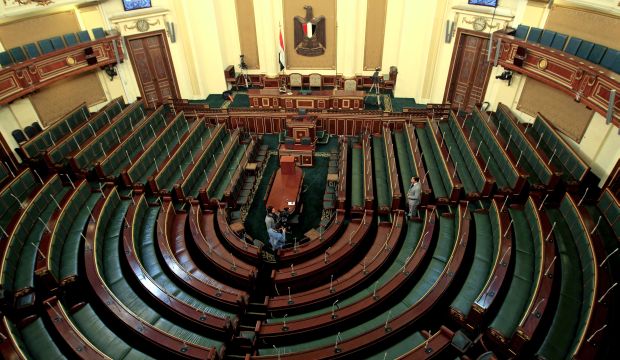
This file photo shows Egypt's People's Assembly on January 22, 2012, in Cairo. (AP Photo/Ahmed Gomaa)
Cairo, Asharq Al-Awsat—There is little chance of Egypt’s diverse political parties being able to respond to a presidential call to put aside their differences and take part in the forthcoming democratic elections as part of a unified electoral list, the head of Egypt’s Congress Party, Omar El-Mokhtar Smeda, said this week.
Speaking to Asharq Al-Awsat, Smeda said “different political visions” and partisan conflicts over securing parliamentary seats would hamper any such efforts towards forming a joint list.
Egyptian President Abdel-Fattah El-Sisi met with party leaders last week and encouraged Egypt’s political parties to put aside their differences and compete in the upcoming elections as part of a united coalition. Although the meeting between the president and 15 party leaders took place behind closed doors, a number of Egyptian politicians confirmed that Sisi had called on party leaders to form an all-encompassing “broad-based national list” which he would then endorse.
Local media reported on Tuesday that 19 political parties are set to meet for a second time to discuss signing an agreement to participate on a single list in the forthcoming parliamentary elections. The agreement is being coordinated by Al-Wafd, Egypt’s oldest political party.
“This [joint] list is a national mission. We welcome everyone to join and the door is still open for them,” the party’s secretary-general, Bahaa Abu Shaqa, said.
However, Smeda told Asharq Al-Awsat: “[In a previous meeting] Al-Wafd discussed expanding its electoral list to include all national political parties, and this was welcomed by some and rejected by others. This means that they can expand its national list, but not to the point that it encompasses all national parties.”
“Forming a joint list at this point is practically impossible,” he added.
Egyptian parliamentary elections are scheduled to begin on March 21 and take place over a number of rounds, before ending on April 27. The parliamentary elections are the third and final step in Egypt’s post-Mursi political roadmap, and go ahead amid uncertainty over the future of Egyptian politics following the outlawing of the Muslim Brotherhood and its Freedom and Justice Party, which had previously enjoyed a parliamentary majority.
Egypt’s new parliamentary election law, passed in June 2014, allocates almost 80 percent of parliamentary seats to individual candidates. The new parliament will be made up of 567 MPs, 420 independents, and 120 party-based MPs. President Sisi will also appoint 27 parliamentary deputies directly by presidential fiat.
